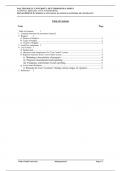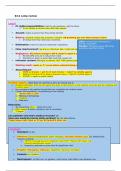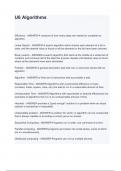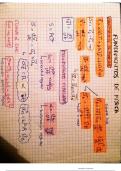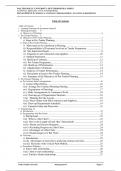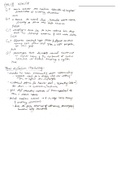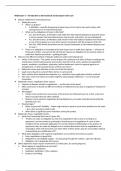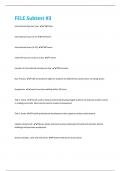WALTER SISULU UNIVERSITY: BUTTERWORTH CAMPUS
NATIONAL DIPLOMA: CIVIL ENGINEERING
MANAGEMENT II: MODULE 6: FINANCIAL PLANNING & CONTROL OF CONTRACTS
Table of Contents
Item Page
Table of Contents 1
1. Learning Outcomes & assessment criteria2
2. Budgets 2
a) Purpose of budgets............................................................................................................................2
b) Types of budgets...............................................................................................................................2
c) Control of budgets.............................................................................................................................3
3. Cash Flow statements 3
4. Cost Control 3
d) Background.......................................................................................................................................3
e) Objectives and components of a ”Cost Control” system..................................................................3
f) Required outcomes from a Cost Control system...............................................................................4
i) Obtaining a true picture of progress...................................................................4
ii) Progress measurement and reporting................................................................4
iii) Frequency and format of cost reporting...........................................................5
g) Cost Control Problems......................................................................................................................5
i) Reasons for Cost “overruns” during various stages of a project.......................5
5. References 5
Walter Sisulu University Management II Page 6.1
, WALTER SISULU UNIVERSITY: BUTTERWORTH CAMPUS
NATIONAL DIPLOMA: CIVIL ENGINEERING
MANAGEMENT II: MODULE 6: FINANCIAL PLANNING & CONTROL OF CONTRACTS
1. Learning Outcomes & assessment criteria
Specified Learning Outcomes Assessment Criteria:
Students must be able to:
1. Demonstrate a contextualized 1. Explain the purpose and types and control of budgets
understanding in the application of within the context of civil engineering construction
cost control measures required to projects
manage civil engineering 2. Explain, apply and determine cash flow requirements
construction projects relating to civil engineering construction projects
3. Explain and apply mechanisms to ensure cost control
over civil engineering construction projects
2. Budgets
a) Purpose of budgets
A budget can be described as “the process of categorising proposed expenditures and
linking them to goals “ (Hellriegel et al, 1995 p.600). Budgets are usually expressed in
monetary value (e.g. rands & cents) and can be compiled for various resources or tasks.
Budgets provide the baseline of expected performance against which managers measure
actual performance. It allows managers to measure the progress made towards achieving
the goals as set by the organisation.
Budgeting has three primary purposes. These are:
To help in planning the work effectively
To assist in the allocation of resources
To assist in controlling and monitoring resource utilisation during the actual construction
period
b) Types of budgets
The type of budgets and budget categories are strongly influenced by the organisation’s
design and culture. Budgets may take various formats. Companies that have functional
structure usually have a budget for each function, (e.g. marketing, production, finance,
human resources, etc.) while this may be broken down at site level in product (task or
activity) format, where there is a budget for each function, (pipelaying, earthworks, etc.).
Budgets may be compiled for companies, departments, project teams, individuals, etc.
The total budget for a project may, for example, include the expected expenditure of all
the resources. For civil engineering projects the resource budgets will include the
following:
Resource components:
Labour budget (e.g. number and name of all the various positions in the company
along with the salary/wages/benefits budgeted for that position)
Material budget
Plant & equipment budget
In civil engineering projects it is however often valuable to have the project broken down
in various tasks (or activities) that need to be performed. A budget is then drawn up for
each activity and the sums of the individual budgets are used to compile the nett cost
(which excludes profit and/or overheads).
The following is an example of a task budget of a civil engineering activity:
Task or activity (e.g. supply, mix and placing of concrete):
Walter Sisulu University Management II Page 6.2
NATIONAL DIPLOMA: CIVIL ENGINEERING
MANAGEMENT II: MODULE 6: FINANCIAL PLANNING & CONTROL OF CONTRACTS
Table of Contents
Item Page
Table of Contents 1
1. Learning Outcomes & assessment criteria2
2. Budgets 2
a) Purpose of budgets............................................................................................................................2
b) Types of budgets...............................................................................................................................2
c) Control of budgets.............................................................................................................................3
3. Cash Flow statements 3
4. Cost Control 3
d) Background.......................................................................................................................................3
e) Objectives and components of a ”Cost Control” system..................................................................3
f) Required outcomes from a Cost Control system...............................................................................4
i) Obtaining a true picture of progress...................................................................4
ii) Progress measurement and reporting................................................................4
iii) Frequency and format of cost reporting...........................................................5
g) Cost Control Problems......................................................................................................................5
i) Reasons for Cost “overruns” during various stages of a project.......................5
5. References 5
Walter Sisulu University Management II Page 6.1
, WALTER SISULU UNIVERSITY: BUTTERWORTH CAMPUS
NATIONAL DIPLOMA: CIVIL ENGINEERING
MANAGEMENT II: MODULE 6: FINANCIAL PLANNING & CONTROL OF CONTRACTS
1. Learning Outcomes & assessment criteria
Specified Learning Outcomes Assessment Criteria:
Students must be able to:
1. Demonstrate a contextualized 1. Explain the purpose and types and control of budgets
understanding in the application of within the context of civil engineering construction
cost control measures required to projects
manage civil engineering 2. Explain, apply and determine cash flow requirements
construction projects relating to civil engineering construction projects
3. Explain and apply mechanisms to ensure cost control
over civil engineering construction projects
2. Budgets
a) Purpose of budgets
A budget can be described as “the process of categorising proposed expenditures and
linking them to goals “ (Hellriegel et al, 1995 p.600). Budgets are usually expressed in
monetary value (e.g. rands & cents) and can be compiled for various resources or tasks.
Budgets provide the baseline of expected performance against which managers measure
actual performance. It allows managers to measure the progress made towards achieving
the goals as set by the organisation.
Budgeting has three primary purposes. These are:
To help in planning the work effectively
To assist in the allocation of resources
To assist in controlling and monitoring resource utilisation during the actual construction
period
b) Types of budgets
The type of budgets and budget categories are strongly influenced by the organisation’s
design and culture. Budgets may take various formats. Companies that have functional
structure usually have a budget for each function, (e.g. marketing, production, finance,
human resources, etc.) while this may be broken down at site level in product (task or
activity) format, where there is a budget for each function, (pipelaying, earthworks, etc.).
Budgets may be compiled for companies, departments, project teams, individuals, etc.
The total budget for a project may, for example, include the expected expenditure of all
the resources. For civil engineering projects the resource budgets will include the
following:
Resource components:
Labour budget (e.g. number and name of all the various positions in the company
along with the salary/wages/benefits budgeted for that position)
Material budget
Plant & equipment budget
In civil engineering projects it is however often valuable to have the project broken down
in various tasks (or activities) that need to be performed. A budget is then drawn up for
each activity and the sums of the individual budgets are used to compile the nett cost
(which excludes profit and/or overheads).
The following is an example of a task budget of a civil engineering activity:
Task or activity (e.g. supply, mix and placing of concrete):
Walter Sisulu University Management II Page 6.2

